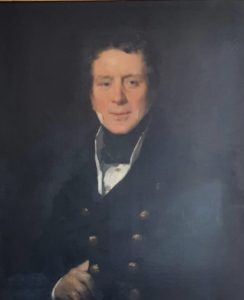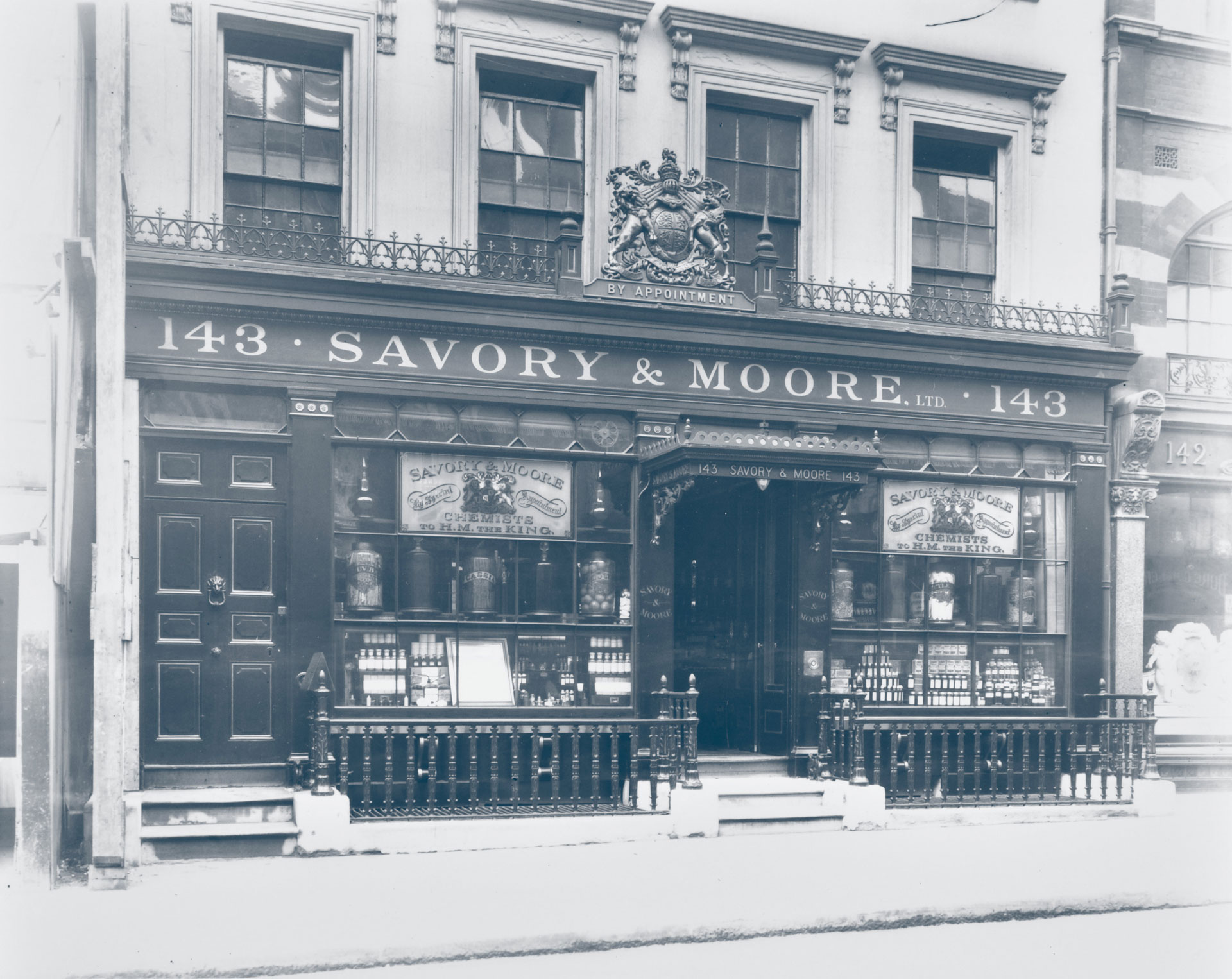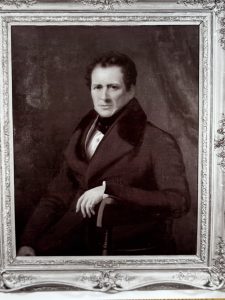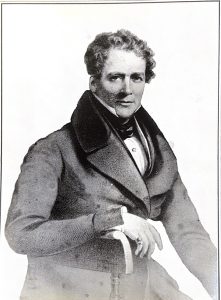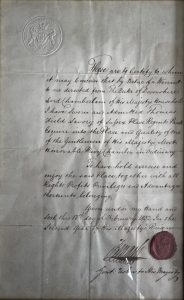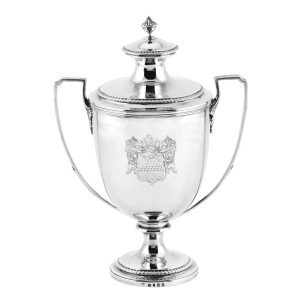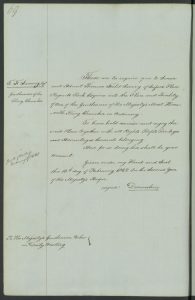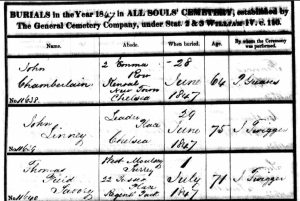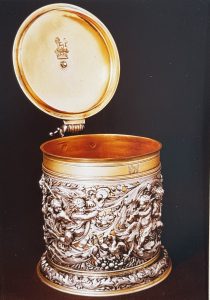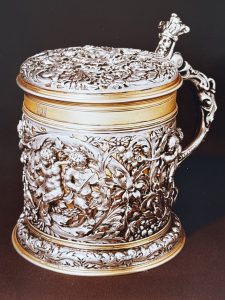-
Place of Birth
Cowley, Gloucestershire
-
Place of Death
London
-
Burial Place
The Catacomb, Anglican Church, Kensall Green Cemetery
Thomas Field Savory was the eldest child (of eight) of John and Sarah Savory, he was born in Cowley, Gloucestershire on 7 July 1776 and died in London on 24 June 1847.
Thomas Field Savory was the son of a miller, yet by the time he was 30 years old, he was not only a partner in the firm of Savory & Moore in fashionable Bond Street, in London’s West End, but he was also a wealthy man.
How did this come about?
Some time in around 1790 he was apprenticed to Mr Thomas Cother, the then principal apothecary and chemist in Cheltenham. Cheltenham in those days was the scene of great social activity due to the popularity of ‘taking the waters‘. Frequent visitors included Their Royal Highnesses The Prince of Wales (later Prince Regent), The Duke of Clarence and The Duke of Sussex as well as many members of the aristocracy and of the theatrical profession.
It is clear that it was at this period of his life that Thomas Field Savory formed many friendships that were to become his social circle when he later moved to London. At Cheltenham he would have also met Dr Edward Jenner, the inventor of the smallpox vaccination, and Thomas Paytherus both of whom were to play an important part in his life. They, amongst others, may have been some of the friends who gave Thomas financial aid. The Reverend Ferryman, the Curate of Cowley, who like Paytherus always seemed to move in the best circles, may also have helped him.
That he was helped is clear from the proceedings of the Consistory Court of the Diocese of Gloucester which took place on the 14th June 1797. In these proceedings, in which Thomas gave evidence, he is described as a gentleman and is quoted as saying “that he is supported by an annual payment from his master Mr Cother and donations from friends.”. This statement suggests Thomas must have had some outstanding qualities which his friends considered made him worthy of their support. The proceedings before the Court concerned the Will of a certain Henry Norwood of Leckhampton (3 miles from Cowley) whom Thomas claimed to have known for seven or eight years. Henry Norwood came from a good family, which suggests that Thomas came in touch with the ‘upper classes’ at an early age.
A further record of Thomas’s period in Cheltenham is contained in the autobiography of Michael Kelly, a well known singer (who also moved with the mightiest), who records that in 1796 “I passed a pleasant week in Cheltenham and amongst other agreeable recollections it is not least to think I formed an acquaintance with my excellent friend Mr Savory…I also had the advantage of originating a friendship with that great and worthy man and friend of the human race, Dr Jenner.”.
The chemist shop at 143 (136 before re-numbering) New Bond Street was originally established in 1794 by Thomas Paytherus as ‘Paytherus and Co.’. The business did well and by 1806 he was seeking partners. This is the start of Savory & Moore. Thomas Moore came from a long line of apothecaries and Thomas has, of course, served his apprenticeship in Cheltenham. Savory and Moore each had to find £4,000, a not inconsiderable sum in those days. (£305,000 in 2025)
Sometime between 1797 and 1806 Thomas Field Savory had accumulated the money or credit to raise this amount of money. How is not known, though there is some evidence to suggest that Thomas might have been in partnership with Paytherus from at least 1804. Be that as it may, in 1806 the firm of Paytherus, Savory and Moore was established. The first branch opened by the firm was in Cheltenham, in 1809.
Thomas went from strength to strength. His home was 22 Sussex Place, Regents Place. Later he also acquired a house in West Molesey facing English actor, playwright, theatre manager and producer, David Garrick’s home at Hampton.
Thomas had a wide circle of friends in the theatrical world. Apart from Michael Kelly, already mentioned, his friends included actor Charles Kemble, actor John Pritt Harley, tenor opera singer John Braham, Mrs Jordan (the mistress of the Duke of Clarence), Anna Starace and opera singer Mrs Billington.
From his Cheltenham days, Thomas had also become an intimate of the Duke of Sussex, their mutual friends included Mrs Billington and Lord Nelson’s mistress Emma, Lady Hamilton.
Lord Nelson ensconced Lady Hamilton in a house in Bond Street, next door but one to 143 New Bond Street. In 1810, she gave Thomas Field Savory a silver cup as a token of her thanks to him for his kindness to her.
Apart from his friendship with the Duke of Sussex, Thomas was also on close terms with his brothers, The Prince Regent (later King George IV) and the Duke of Clarence (later King William IV). Evidence of his friendship with the former was recorded by Mrs Creevy when she wrote to her husband, the politician, Thomas Creevy from Brighton on 5th November 1805:
“The conversation between the Prince and me…Lady Downshire soon came…then Geoff and Mrs Fritz, and soon afterwards the men from the dining room, consisting only of Day and Warner, Savory, Bloomfield and the Baron.” (Creevy, revised edition 1948).
In 1815, Savory & Moore (Paytherus had retired from the business in 1811) opened a branch in Brighton.
Shortly after the Duke of Clarence ascended the throne as William IV, the Lord Chamberlain appointed Thomas Field Savory a gentleman of His Majesty’s Most Honourable Privy Chamber, a sinecure in the Royal Household.
Thomas Field Savory obviously lived in high style. However, he lacked the crest and coat of arms to go with it. Not being entitled to either, he solved his problem by ‘borrowing’ those of the Savery’s of Devon, which had been granted to Sir Christopher Savery (d.1623).
The crest is ‘a heron with wings displayed holding an olive branch in its beak’. The motto of the Savery’s of Devon was Aut vita Liberia or Mors Gloriosa (Either Life of Liberia or Glorious Death) which Thomas Field Savory changed to the more prosaic Diligentia et Labore (Diligence and hard work).
Lt General Sir Reginald Savory thought the original motto far more inspiring. When therefore the people of East Anstey in Devon presented him with a piece of plate to mark his return from World War 2, he had the crest engraved on it with the original motto.
Savory and Moore sold several well known proprietary products. One of the most successful ones was Seidlitz Powders (laxatives), an effervescing aperient drink. In fact in became so well known that when Thomas Field went horse riding in the park he was often referred to as ‘Count Seidlitz’. Many imitations were produced which were the cause of much trouble to the firm, which eventually issued a statement:
“We are having a new label with the arms of Mr Savory engraved in the centre…which we trust will defy imitation and fix the article as our own.”. Thus commenced the practice, continued up to 1966, of displaying the crest of the products of Savory & Moore.
Thomas Field Savory became an active and distinguished Freemason, which was almost certainly due to the influence of his friend the Duke of Sussex. The Duke had become Grand Master of the United Grand Lodge of Masons in 1813 and Thomas became a mason in 1818 in the Jerusalem Lodge. He was also a member of the Lodge of Antiquity and of the Prince of Wales Lodge, both being Lodges of which the Duke of Sussex was also a member.
Thomas Field Savory seems to have always maintained his connection with Cheltenham. Ernest Jeffery Charles Savory recalled that his Aunt Proctor (sister of Martha, wife of John Savory) told him that Thomas used to drive down to Cheltenham in his coach and four and that bells would be rung in his honour.
He died on 24th June 1847 at West Moseley. He left nearly all his estate to his nephew John Savory, as he never married. His coffin was placed in the catacomb below the Anglican Chapel in Kensall Green Cemetery on 1st July 1847. Meaning he would be in a lead coffin.
An obituary which was published in the Freemason’s Review said ” the deceased was the last surviving partner of the late firm of Paytherus, Savory and Moore. He was an intimate friend of the late Duke of Sussex…Bro Savory was a somewhat proud man in his bearing yet gentlemanly at all times”.
Thomas was, incidentally, a very tall man, reputedly 6ft 4 inches in height.
Thomas Field Savory
(1776 - 1847)

